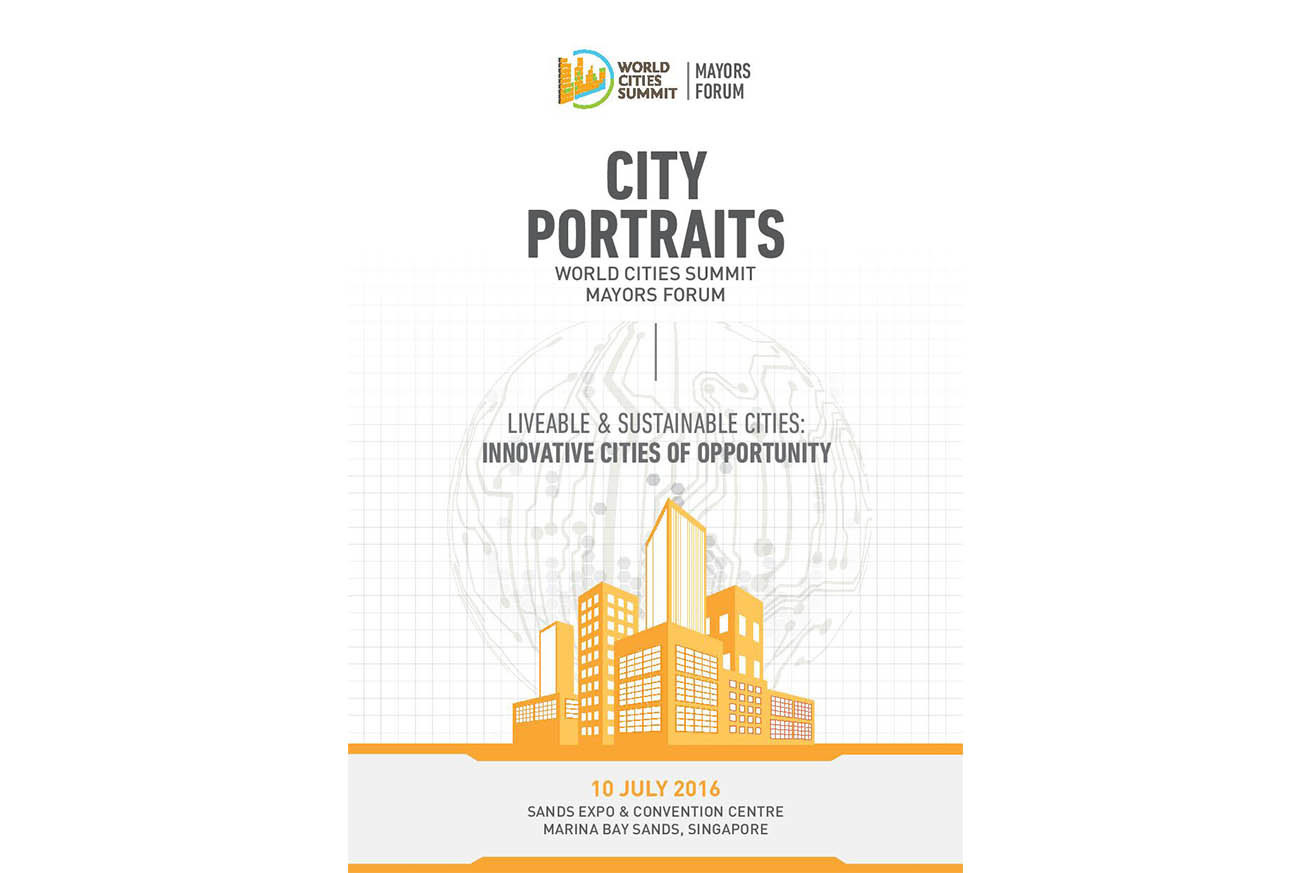Home >
About Us >
Past Editions >
World Cities Summit 2016
World Cities Summit 2016
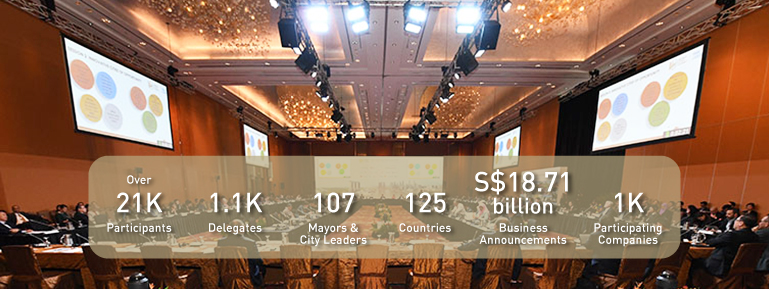
New ways to exploit the opportunities of rising global urbanisation were at the centre of discussions at the 5th World Cities Summit, held from 10–14 July 2016 in Singapore, under the theme: “Liveable & Sustainable Cities: Innovative Cities of Opportunity”.
Migration from rural to urban areas increases people’s total energy consumption tenfold, therefore renewable solutions are needed to adequately provide for a doubling of the
global urban population. Delegates noted that since 80 per cent of world GDP comes from urban centres it would be more sustainable to look at urbanisation as a tool for development and increasing wealth for the larger population.
The problems and issues raised, and the solutions shared, highlighted the global need to focus on governance, technology and social innovations to build resilient, liveable and sustainable cities of the future. The Summit also placed the spotlight on the softer aspects of a sustainable and liveable city, in particular, how heritage and culture can be integrated in the urban planning and design of cities.
Key insights:
- Long-term vision and planning are the foundation for everything else as solutions to persistent problems can span several decades and terms of elected city leaders.
- Inclusive development brings everyone along and is key to addressing global issues such as rapid ageing and growing inequality.
- Social cohesion is essential for addressing tensions within societies.
- Sustainability hinges on constant public education.
- Cities should also exercise leadership nationally and regionally, becoming part of a virtuous cycle of development and to contribute to discussions at the national level.
- Smart cities must adapt to technology and a louder citizen voice.
- Cities should invest more in social capital and culture.
MAYORS FORUM
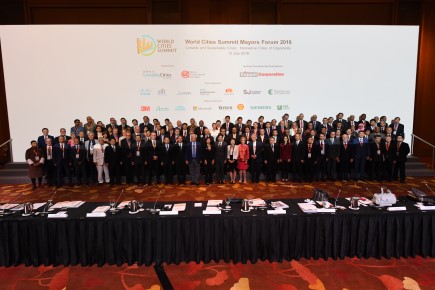
What are some innovative ways to exploit the new opportunities for greater liveability? This was the key question explored by 92 mayors and city leaders from 64 countries at the 7th WCS Mayors Forum.
Among the best approaches to enhancing city liveability, foremost is the importance of having good organisation and long-term, coordinated planning up to 50 years, based on a clear shared vision.
Cities must cater also for some flexibility to urban plans to adjust to changing social and economic conditions over time, especially given global uncertainties. While implementing and evaluating these plans, efforts should be made to maximise the potential of innovations in technology, to engage and involve citizens more in city governance. To work better with multiple levels of government, the mayors recognised the need to take the extra step and initiative to engage with them so as to secure the legislative and administrative support needed to empower them to achieve their highest goals.
Cities must cater also for some flexibility to urban plans to adjust to changing social and economic conditions over time, especially given global uncertainties. While implementing and evaluating these plans, efforts should be made to maximise the potential of innovations in technology, to engage and involve citizens more in city governance. To work better with multiple levels of government, the mayors recognised the need to take the extra step and initiative to engage with them so as to secure the legislative and administrative support needed to empower them to achieve their highest goals.
The Mayors Forum Declaration pledged to implement a vision of cities, encapsulated in the Liveability Framework, that seeks to:
- Provide a competitive economy that generates and sustains income as well as creates opportunities for growth.
- Prioritise a sustainable environment through planning that reduces the long-term negative impact of economic development.
- Offer a high quality of life enriched by a vibrant economy, rich culture and a city with nature.
LEE KUAN YEW WORLD CITY
PRIZE LAUREATE CITY: MEDELLÍN, COLOMBIA
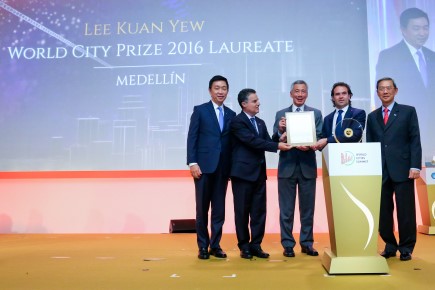
Medellín was awarded the 2016 Lee Kuan Yew World City Prize. The Colombian city has transformed itself from a notoriously violent city to one that is being held up as a model for urban innovation within a span of just two decades.
Over a sustained period, a succession of leaders have demonstrated the willingness to recognise and take on deep-rooted problems—the wealth division, lack of equity and opportunities for its citizens that had allowed crime to overwhelm the city in the past—providing the much-needed continuity for efforts to rehabilitate neighbourhoods and improve living conditions in the informal settlements. Working with limited resources, Medellín has devised alternative means of generating funds and implemented catalytic projects in strategic areas where they can bring about the greatest impact.
On the whole, what Medellín has achieved is not only an inspiration for cities looking to overcome similar challenges, but also provides many valuable lessons for all cities worldwide.
YOUNG LEADERS SYMPOSIUM
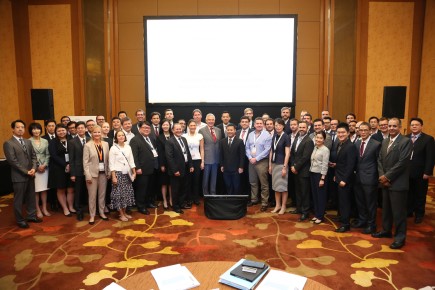
The Young Leaders Symposium focused on the perennial “wicked problems” that plague cities and are exceptionally complicated and difficult to solve. The discussions focused on environmental concerns, data and technology, partnerships and values.
Wicked problems range from ageing societies to ageing infrastructure and include dilemmas between localisation and globalisation; access to, use of and management of data; the rapid densification of cities; increased and unmanaged growth; ensuring equity; misalignment of assets and resources; and long-term planning, environmental and sustainability challenges.
Solving such diverse problems requires good planning and management, forging partnerships with businesses and other cities and engaging with data scientists and engineers in the business of cities so that cities can be more in the know, and not merely guessing.
THEMATIC TRACKS
Discussion 1: Innovative Solutions: New Answers to Wicked Problems
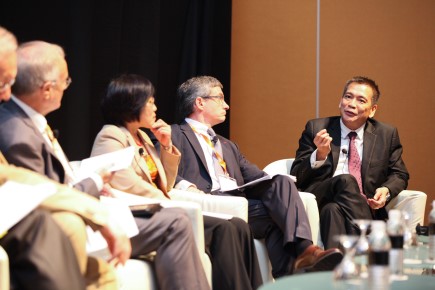 Tackling “wicked problems”—which accept no quick fixes but are complex and require sometimes subtle and sophisticated solutions—calls for a measure of innovation by cities.
Tackling “wicked problems”—which accept no quick fixes but are complex and require sometimes subtle and sophisticated solutions—calls for a measure of innovation by cities.
Key observations:
- Mayors need to bring national governments on board to see urbanisation as an investment in achieving other national objectives.
- Liveability must be placed at the heart of urbanisation; well-planned integrated programmes can carry out city development while preserving nature.
- Cities need to figure out how to apply big data ethically to enhance city management without infringing on civil liberties and encroaching on privacy.
- City leaders need to mobilise energy and innovations from the more tech-savvy populations, while fostering learning and participation from the less tech-savvy.
- The best way to foster safety and social resilience is to invest in all aspects of city liveability, from cleaner air to bicycle lanes.
Discussion 2: Innovative Governance: Inventing the Toolbox for Better Cities
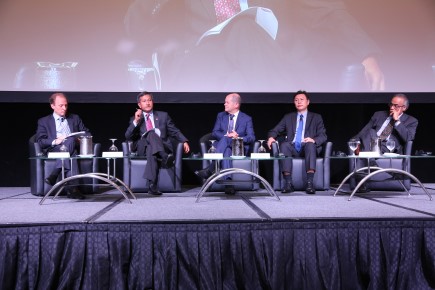 As city mayors search for better and more effective ways to manage and lead their cities, they are constantly pushed to seek more innovative ways to do their job better. They require new tools that are sharper and better-designed to perform the necessary tasks, even as they are bound by the daily duties and demands of good governance.
As city mayors search for better and more effective ways to manage and lead their cities, they are constantly pushed to seek more innovative ways to do their job better. They require new tools that are sharper and better-designed to perform the necessary tasks, even as they are bound by the daily duties and demands of good governance.
Key observations:
- Focus more on organisation at the human scale; invest more effort to inspire and galvanise action among citizens for bottom-up initiatives for enduring social impact.
- Staying close to the basics—such as meeting the people’s simplest needs, from sanitation to transport—remains at the core of efforts to enhance liveability.
- Mainstreaming resilience can help cities to bounce back from crises more effectively. This includes everything from social cohesion to cybersecurity.
- Cities and leaders that secure buy-in for a clear, long-term vision will be better placed to garner resources from internal and external stakeholders.
- Public sector bodies must resist siloed approaches to shared challenges such as coping with natural disasters.
- Digital platforms can be exploited to expand the reach of citizen engagement.
- Participatory budgeting can start a virtuous cycle of improved legitimacy of governments and strengthen further citizen participation.
- Cities can exercise leadership and engaging with neighbours by participating in regional initiatives or investing in areas that have payoffs for the city itself, such as promoting the use of sustainable materials by a city that produces them.
